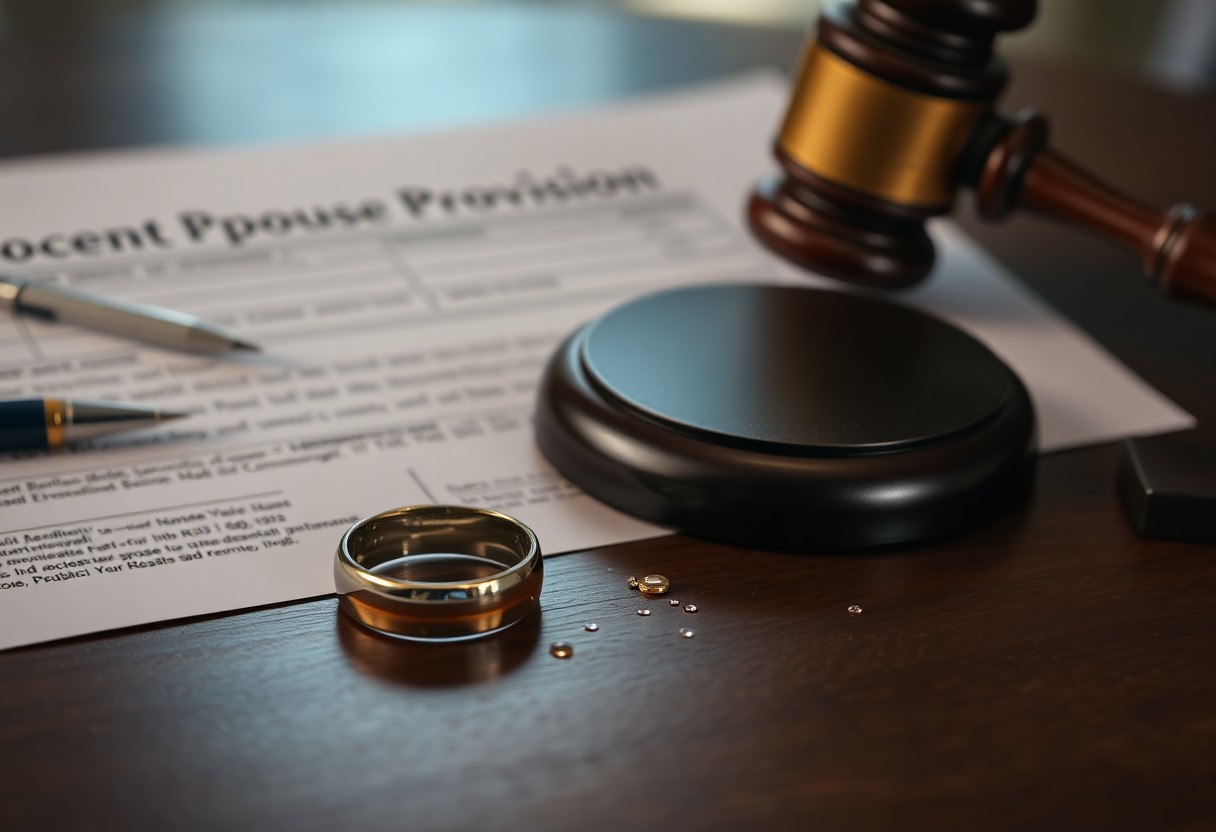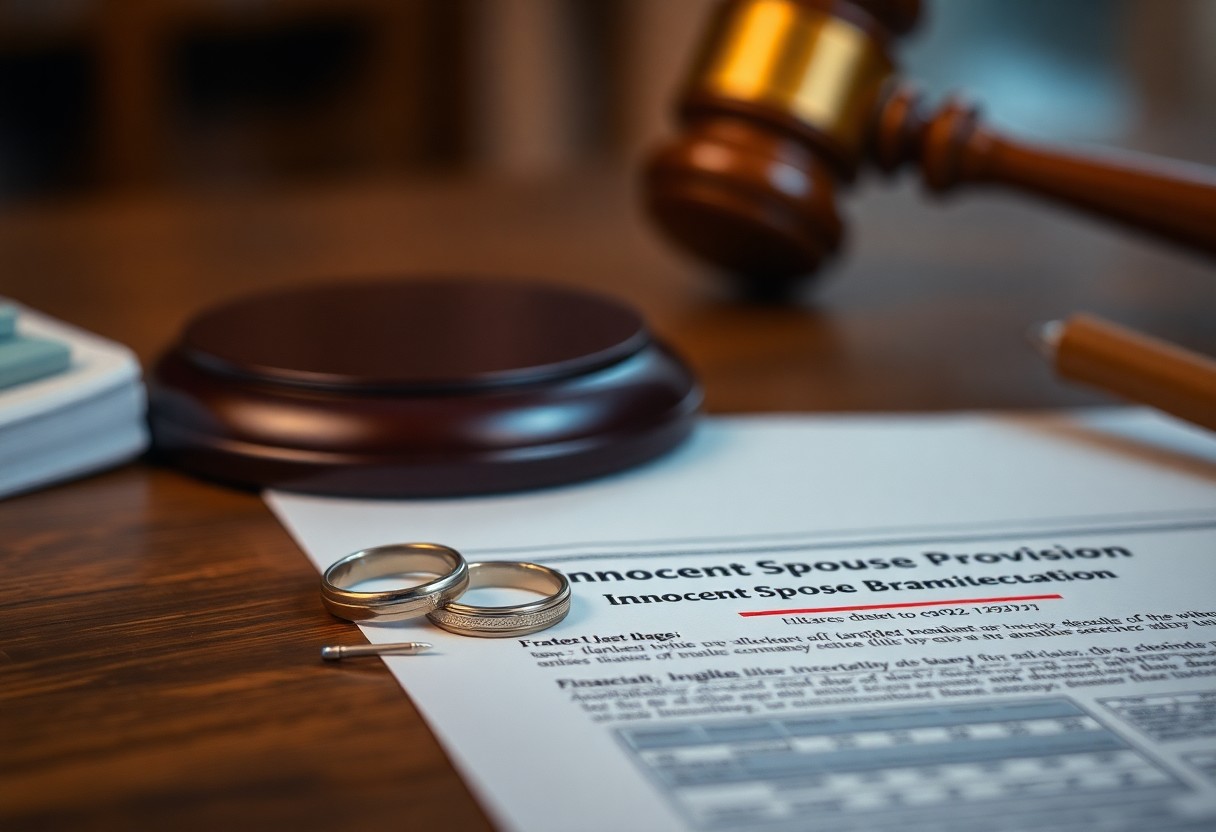You may be unaware of the financial risks you face due to your spouse’s tax errors or fraud. As you navigate the complexities of tax law, understanding the innocent spouse provision can be a vital step in protecting your assets. You can shield your financial future by exploring this provision, which may offer relief from joint liability. By delving into the details, you can make informed decisions to secure your financial well-being. Your financial security depends on being informed about this provision.

Eligibility Criteria
A key aspect of the Innocent Spouse Provision is determining whether you qualify for relief. As you consider this option, you’ll need to examine your individual circumstances and how they align with the eligibility criteria. You should begin by gathering all relevant financial documents and information, including your tax returns, marital status, and any communication with your spouse regarding financial matters. This will help you assess your situation and determine the best course of action. You may also want to consult with a tax professional or attorney to ensure you have a thorough understanding of the process and the potential outcomes.
As you navigate the eligibility criteria, you’ll discover that the Innocent Spouse Provision is designed to provide relief to individuals who are not responsible for the tax debt. You may be eligible if you can demonstrate that you were unaware of the tax debt or had no reason to know about it. Your situation will be evaluated based on various factors, including your level of involvement in the household finances and your ability to pay the tax debt. You will need to provide detailed information about your financial situation and any steps you took to address the tax debt, if applicable.
Qualifying for the Provision
Besides meeting the basic eligibility criteria, you must also demonstrate that you meet specific conditions to qualify for the Innocent Spouse Provision. You will need to show that you filed a joint tax return with your spouse and that there is an underpayment or understatement of tax on the return. You should also be prepared to provide evidence that you had no knowledge or reason to know of the error or underpayment when you signed the tax return. Your situation will be carefully evaluated to determine whether you qualify for relief under the Innocent Spouse Provision.
Beyond the initial evaluation, you will need to continue meeting the conditions of the provision to maintain your eligibility. You should be aware that the IRS may request additional information or documentation to support your claim, and you must be prepared to provide this information in a timely manner. You may also want to consider seeking professional advice to ensure you are meeting all the requirements and to help guide you through the process.
Meeting the Requirements
Qualifying for the Innocent Spouse Provision requires careful attention to detail and a thorough understanding of the eligibility criteria. You must ensure that you meet all the requirements, including filing Form 8857, Request for Innocent Spouse Relief, and providing supporting documentation. You should also be prepared to demonstrate that you were not responsible for the tax debt and that you had no reason to know about it. Your application will be evaluated based on the information you provide, so it’s important that you are accurate and thorough in your submission.
Understanding the requirements for meeting the Innocent Spouse Provision is vital to a successful application. You should take the time to carefully review the eligibility criteria and ensure that you meet all the conditions. You may also want to consider seeking professional advice to help guide you through the process and ensure that you are taking the necessary steps to qualify for relief. By doing so, you can increase your chances of a successful outcome and protect your financial future. As you navigate the process, you’ll be better equipped to make informed decisions about your situation and take control of your finances. You will be able to move forward with confidence, knowing that you’ve taken the necessary steps to safeguard your financial well-being.
Benefits of the Innocent Spouse Provision
Now that you have a basic understanding of the Innocent Spouse Provision, it’s time to explore the benefits it can offer. This provision can be a valuable tool in protecting your financial future, especially if you find yourself in a situation where your spouse’s tax debt is threatening your financial stability. By understanding how this provision works and how to qualify for it, you can take steps to safeguard your financial well-being and avoid potential financial pitfalls.
As you consider the benefits of the Innocent Spouse Provision, you’ll want to examine the various ways it can help you. This includes the potential for
Financial Protection
Benefits like shielding your assets from your spouse’s tax debt can be a significant advantage. You’ll be able to protect your hard-earned income and assets from being seized by the IRS to pay off your spouse’s tax liabilities. This can be especially important if you’re facing a situation where your spouse’s tax debt is substantial, and you’re concerned about the impact it could have on your financial future. By seeking innocent spouse relief, you can ensure that your financial situation is protected, and you’re not left with a significant debt that you didn’t incur.
Additionally, the financial protection offered by the Innocent Spouse Provision can also extend to your credit score. If your spouse’s tax debt is reported on your credit report, it could negatively impact your credit score, making it more difficult for you to obtain credit in the future. By qualifying for innocent spouse relief, you can avoid this potential damage to your credit score, and ensure that your creditworthiness is not affected by your spouse’s tax debt.
Reduced Liability
Around the time you’re dealing with the complexities of tax debt, you may be looking for ways to reduce your liability. The Innocent Spouse Provision can offer you a way to do just that, by allowing you to avoid paying your spouse’s tax debt. This can be a significant benefit, especially if your spouse’s tax liabilities are substantial. By qualifying for innocent spouse relief, you can avoid being held responsible for your spouse’s tax debt, and ensure that you’re not left with a significant financial burden.
Further, when you’re able to reduce your liability through the Innocent Spouse Provision, you’ll also be able to avoid the associated penalties and interest that can accrue on unpaid tax debt. This can be a significant advantage, as these penalties and interest can add up quickly, making it even more difficult to pay off the debt. By avoiding these additional costs, you can ensure that you’re not facing an even larger financial burden, and that you’re able to move forward with a cleaner financial slate.
Application Process
Clearly, the application process for the Innocent Spouse Provision is a complex and nuanced one, requiring careful consideration and attention to detail. As you navigate this process, you will need to carefully evaluate your eligibility and gather the necessary documentation to support your claim. The Innocent Spouse Provision is designed to provide relief to individuals who have become embroiled in tax debt due to the actions of their spouse, and it is crucial that you understand the requirements and procedures involved in applying for this provision. By doing so, you can ensure that your financial future is protected and that you are not unfairly held liable for taxes that are not your responsibility.
The application process typically begins with a thorough review of your tax situation and a determination of your eligibility for the Innocent Spouse Provision. You will need to consider factors such as the nature of the tax debt, the extent of your involvement in the tax-related activities, and the degree to which you were aware of or participated in the actions that led to the tax liability. As you proceed with the application process, you will need to be prepared to provide detailed information and documentation to support your claim, and to demonstrate that you meet the necessary criteria for relief under the Innocent Spouse Provision.
Filing the Request
Between the initial review of your tax situation and the final submission of your application, you will need to carefully prepare and file a request for relief under the Innocent Spouse Provision. You will need to complete the necessary forms, including Form 8857, and submit them to the IRS, along with any supporting documentation and information. As you file your request, you should be prepared to provide a detailed explanation of your situation and to demonstrate that you meet the necessary criteria for relief. You should also be prepared to respond to any follow-up questions or requests for additional information from the IRS, and to wait for a determination on your application.
Besides the formal application, you may also need to provide additional information or support to substantiate your claim. You should be prepared to provide detailed records and documentation, including tax returns, financial statements, and other relevant information. As you gather and submit this information, you should be careful to ensure that it is accurate and complete, and that it supports your claim for relief under the Innocent Spouse Provision. By providing thorough and detailed information, you can help to facilitate the application process and increase the likelihood of a successful outcome.
Required Documentation
For the purposes of your application, you will need to gather and submit a range of documentation to support your claim for relief under the Innocent Spouse Provision. You should be prepared to provide detailed records and information, including tax returns, financial statements, and other relevant documents. As you gather this information, you should be careful to ensure that it is accurate and complete, and that it supports your claim for relief. You should also be prepared to provide information about your marriage, your financial situation, and any other factors that may be relevant to your application.
For instance, you may need to provide documentation such as joint tax returns, proof of income, and records of any financial transactions or activities that may be relevant to your claim. You should also be prepared to provide information about any Communications with your spouse or former spouse, as well as any other parties who may have been involved in the tax-related activities. By providing thorough and detailed documentation, you can help to support your claim and increase the likelihood of a successful outcome.
In addition, as you gather and submit the required documentation, you should be aware that the IRS may also require additional information or support to verify your claim. You should be prepared to respond to follow-up questions or requests for further documentation, and to provide any additional information that may be needed to process your application. By being thorough and diligent in your preparation, you can help to ensure that your application is complete and accurate, and that you receive the relief to which you are entitled under the Innocent Spouse Provision.

Potential Outcomes
All taxpayers who file for innocent spouse relief are eager to know the potential outcomes of their application. You may be wondering what happens after you submit your request, and what you can expect from the process. The innocent spouse provision is designed to provide financial protection to spouses who are not responsible for their partner’s tax debts. As you navigate this process, it’s important to understand the possible outcomes and how they may impact your financial future. You should be aware that the IRS will carefully review your application, and the outcome will depend on the specifics of your situation.
All factors, including your financial situation, marital status, and the circumstances surrounding the tax debt, will be taken into account. You can expect the IRS to request additional information and documentation to support your claim. As you wait for a decision, you may feel anxious about the potential outcome, but understanding the possibilities can help you prepare for what’s to come. The innocent spouse provision can provide significant relief, but it’s not a guarantee, and you should be prepared for any outcome.
Approval and Relief
Beyond the initial application, you may be wondering what happens if your request is approved. Between the time you submit your application and the final decision, you can expect the IRS to verify the information you provided. You will be notified in writing if your application is approved, and the IRS will inform you of the amount of relief you are eligible for. As you receive the news, you may feel a sense of relief, knowing that you are no longer responsible for your spouse’s tax debt. You should be aware that the approval process may take several months, and you should plan accordingly.
Besides the financial relief, an approved application can also bring emotional relief, as you will no longer be held responsible for your spouse’s tax debt. Between the initial application and the final approval, you may need to provide additional information or documentation to support your claim. You should be prepared to cooperate with the IRS and provide any necessary information to ensure a smooth process. As you navigate this process, you should stay informed about the status of your application and plan for the potential outcomes.
Denial and Next Steps
One of the potential outcomes of your application is denial, which can be disappointing and overwhelming. One thing to keep in mind is that a denial is not the end of the process, and you have the right to appeal the decision. You should carefully review the notice of denial and understand the reasons behind the IRS’s decision. One option you have is to request a conference with the IRS Appeals Office, where you can present your case and provide additional information to support your claim.
Denial of your innocent spouse relief application can be a setback, but it’s not the end of the road. You have the right to appeal the decision and present your case to the IRS Appeals Office. You should be prepared to provide additional information and documentation to support your claim, and you may want to consider seeking the advice of a tax professional to help you navigate the appeals process. As you move forward, you should stay informed about your options and plan for the potential outcomes, ensuring that you are prepared for any situation that may arise.

Common Challenges
Not all taxpayers are aware of the Innocent Spouse Provision, and even those who are may still face significant hurdles when trying to take advantage of it. You may be surprised to learn that the provision is not automatically applied, and you will need to apply for it by filing Form 8857 with the IRS. This can be a complex and time-consuming process, especially if you are not familiar with tax law. You will need to gather extensive documentation to support your claim, including records of your income, expenses, and tax payments.
As you navigate the Innocent Spouse Provision, you will encounter various challenges that can impact your financial future. You should be prepared to address these challenges head-on, and seeking the advice of a tax professional may be necessary to ensure you are taking the right steps. Your financial situation is unique, and the IRS will carefully review your application to determine whether you qualify for relief under the Innocent Spouse Provision.
Proving Innocence
Against the backdrop of a potentially lengthy and complicated process, you will need to prove that you had no knowledge of the tax error or underreporting that led to the tax debt. You will need to demonstrate that you did not actively participate in the preparation of the tax return, and that you had no reason to know about the error. You should gather evidence to support your claim, including statements from your spouse or former spouse, as well as any other relevant documents.
Adversely, you may face skepticism from the IRS, and you will need to be prepared to address any concerns they may have. You should be transparent about your financial situation and provide detailed information about your income, expenses, and tax payments. Your goal is to demonstrate that you are an innocent spouse, and that you should not be held liable for the tax debt incurred by your spouse or former spouse.
Dealing with the IRS
Around the time you submit your application, you will likely be in close contact with the IRS, and you should be prepared for a potentially lengthy and complex process. You will need to respond to any requests for additional information or documentation, and you should be patient and persistent in your dealings with the IRS. Your application will be carefully reviewed, and you should be prepared to address any concerns or issues that arise during the review process.
This process can be daunting, but you should not be discouraged. You have the right to seek relief under the Innocent Spouse Provision, and you should take all necessary steps to protect your financial future. You will need to stay organized and focused throughout the process, and you should be prepared to seek the advice of a tax professional if you need guidance or support. By taking a proactive and informed approach, you can navigate the challenges of dealing with the IRS and increase your chances of a successful outcome.
Strategic Planning
After understanding the Innocent Spouse Provision, you can begin to develop a strategic plan to protect your financial future. This involves being proactive and taking steps to ensure that you are not held liable for your spouse’s tax debts. You should start by reviewing your tax returns and financial records to identify any potential issues that could lead to tax debts. You should also consider seeking the advice of a tax professional or financial advisor who can help you navigate the complexities of the tax code and develop a plan to minimize your liability.
By taking a strategic approach to your financial planning, you can help safeguard your financial future and avoid the stress and uncertainty of dealing with tax debts. You should consider developing a comprehensive financial plan that takes into account your income, expenses, assets, and debts, as well as your long-term financial goals. This will help you make informed decisions about your finances and ensure that you are on track to achieving your goals.
Pre-emptive Measures
Across various financial scenarios, you will find that pre-emptive measures are crucial in protecting your financial well-being. You should consider taking steps to separate your finances from your spouse’s, such as maintaining separate bank accounts and credit cards. You should also consider filing separate tax returns, which can help to minimize your liability in the event that your spouse is found to be liable for tax debts. By taking these pre-emptive measures, you can help to protect your financial future and avoid the potential risks associated with joint tax liability.
Across different situations, you will find that pre-emptive measures can vary in complexity and scope. You should consider seeking the advice of a tax professional or financial advisor who can help you develop a personalized plan that takes into account your unique financial situation and goals. They can help you identify potential risks and develop strategies to mitigate them, ensuring that you are well-prepared for any eventuality.
Long-term Financial Security
Along with developing a strategic plan, you should also focus on achieving long-term financial security. You should consider developing a comprehensive financial plan that takes into account your income, expenses, assets, and debts, as well as your long-term financial goals. This will help you make informed decisions about your finances and ensure that you are on track to achieving your goals. You should also consider investing in a diversified portfolio of assets, such as stocks, bonds, and real estate, which can help to generate long-term wealth and financial security.
Along the way, you will encounter various challenges and obstacles that can impact your financial security. You should consider seeking the advice of a financial advisor who can help you navigate these challenges and stay on track to achieving your long-term financial goals. They can help you develop a personalized plan that takes into account your unique financial situation and goals, and provide guidance and support to help you overcome any obstacles that you may encounter.
Also, as you work towards achieving long-term financial security, you should consider the importance of maintaining a strong credit score and managing your debt effectively. You should make timely payments on your debts and keep your credit utilization ratio low, which can help to improve your credit score and reduce your interest rates. By maintaining a strong credit score and managing your debt effectively, you can help to ensure that you have access to credit when you need it, and that you are able to achieve your long-term financial goals.
To wrap up
Ultimately, unraveling the Innocent Spouse Provision can be a valuable tool in safeguarding your financial future. You may find yourself in a situation where you are facing unintended tax liabilities due to the actions of your spouse, and understanding your rights under this provision can help you avoid financial devastation. By familiarizing yourself with the conditions and requirements of the Innocent Spouse Provision, you can take proactive steps to protect your financial well-being and ensure that you are not held accountable for debts that are not your own. You should carefully review your tax obligations and seek professional advice if you suspect that you may be eligible for relief under this provision.
As you move forward, you will be better equipped to navigate the complexities of tax law and make informed decisions about your financial situation. You will be able to identify potential risks and take steps to mitigate them, ensuring that your financial future is secure. By taking control of your financial situation and understanding the Innocent Spouse Provision, you can avoid unnecessary stress and financial hardship, and instead focus on building a stable and prosperous future for yourself. You deserve to have peace of mind when it comes to your finances, and unraveling the Innocent Spouse Provision can be a key step in achieving that goal, allowing you to protect your assets and your financial future with confidence.















